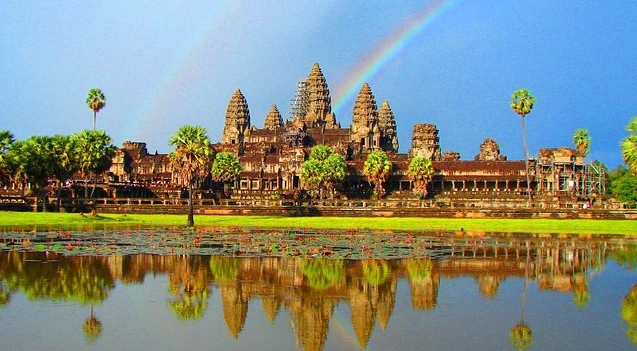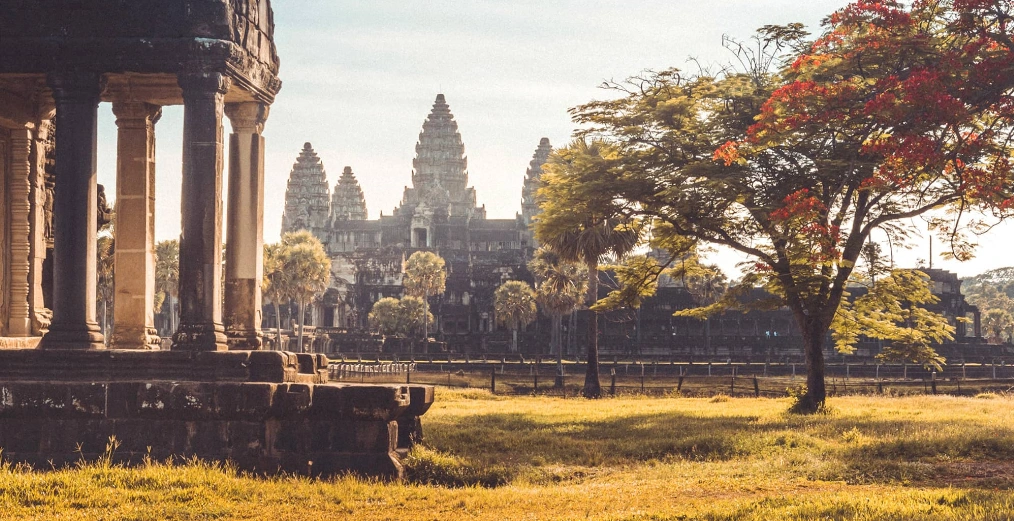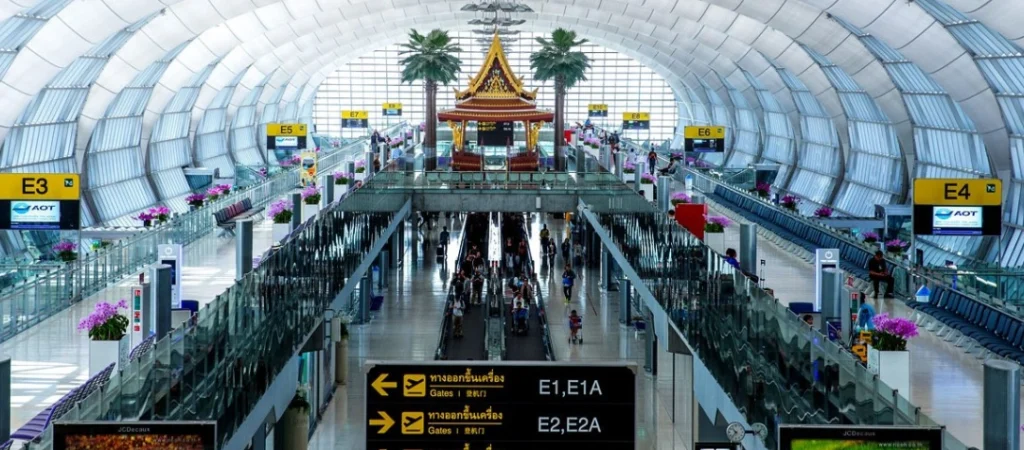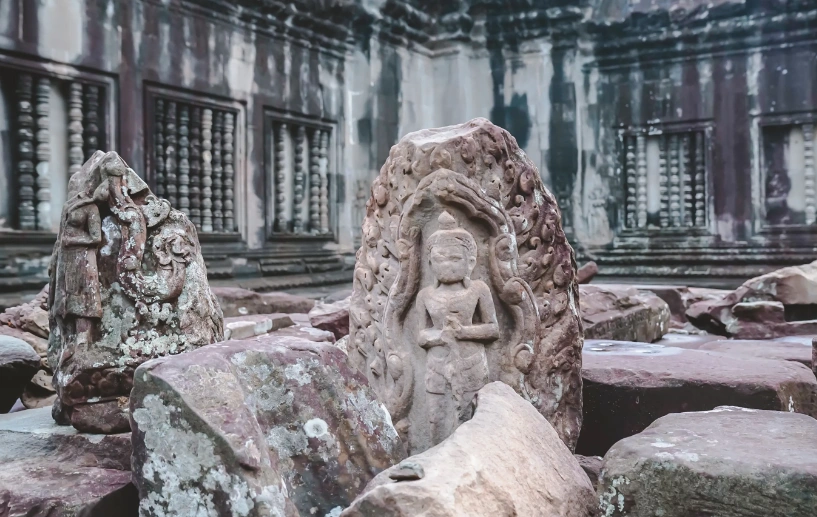
angkor wat tour from bangkok Embark on an unforgettable adventure with our Angkor Wat Tour from Bangkok. Immerse yourself in the mystical allure of one of Southeast Asia’s most iconic archaeological sites as you journey from the vibrant streets of Bangkok to the ancient wonders of Angkor Wat in Siem Reap, Cambodia. Witness the architectural marvels, intricate carvings, and rich cultural heritage of this UNESCO World Heritage Site. Guided by expert local guides, delve into the history, spirituality, and significance of Angkor Wat as you explore its majestic temples and lush surroundings. From the captivating sunrise over the temple complex to the mesmerizing sunset vistas, every moment promises to be a testament to the grandeur of the Khmer Empire. Experience the magic of Angkor Wat on our meticulously crafted tour, where history comes to life amidst the timeless beauty of Cambodia’s cultural treasure.
Table of Contents
A. Brief Overview of Angkor Wat:
Angkor Wat stands as one of the most iconic and revered archaeological sites in Southeast Asia. Situated in the northern province of Siem Reap, Cambodia, Angkor Wat is a sprawling temple complex dating back to the 12th century. Initially constructed as a Hindu temple dedicated to the god Vishnu, it later transformed into a Buddhist temple towards the end of the 12th century.
The architecture of Angkor Wat is a masterpiece of Khmer civilization, characterized by its intricate carvings, imposing towers, and vast moats, reflecting the grandeur of the Khmer Empire. Its symmetrical layout, bas-reliefs depicting Hindu epics like the Ramayana and Mahabharata, and the central sanctuary tower are testaments to the ingenuity and craftsmanship of its builders.
B. Importance of Angkor Wat in Cambodian History and Culture:
Angkor Wat holds immense significance in Cambodian history and culture. It serves as a symbol of national pride, representing the Khmer Empire’s zenith and its cultural achievements. The temple complex not only served as a religious center but also as a political and administrative hub for the empire.
Throughout its history, Angkor Wat has witnessed the rise and fall of kingdoms, enduring centuries of both prosperity and decline. Its preservation over the centuries speaks volumes about the enduring legacy of Khmer architecture and craftsmanship.
In contemporary Cambodian society, Angkor Wat plays a crucial role in fostering a sense of identity and belonging among the people. It serves as a pilgrimage site for Buddhists and a source of inspiration for artists, writers, and historians alike, contributing to the cultural fabric of the nation.
C. Purpose of the Tour:
The purpose of embarking on an Angkor Wat tour from Bangkok extends beyond mere sightseeing; it is an opportunity to delve into the rich tapestry of history, art, and spirituality that defines this UNESCO World Heritage Site.
This tour aims to provide participants with a comprehensive understanding of Angkor Wat, its historical significance, and its cultural legacy. Through guided exploration of the temple complex, visitors will gain insights into the architectural marvels, religious practices, and societal structures of the Khmer Empire.
Moreover, the tour seeks to foster cross-cultural exchange and appreciation by engaging with local communities and immersing participants in the vibrant culture of Cambodia. By experiencing firsthand the allure of Angkor Wat and its surroundings, travelers can forge lasting memories and deepen their appreciation for this ancient wonder of the world.
Preparations angkor wat tour from bangkok

Prepare for an immersive journey of discovery with our comprehensive guide to Angkor Wat Tour preparations. Whether you’re a seasoned traveler or embarking on your first adventure, careful planning ensures a seamless and enriching experience. From booking accommodations in Siem Reap to navigating visa requirements and currency exchange, our detailed preparations outline everything you need to know before setting foot in this ancient wonderland. Gain insights into visa regulations, currency exchange options, and essential planning tips to make the most of your Angkor Wat exploration. Let us guide you through the intricacies of trip planning so you can focus on embracing the history, culture, and spirituality that await you at Angkor Wat.
A. Planning and Booking:
Planning a trip to Angkor Wat from Bangkok involves several key steps to ensure a smooth and enjoyable experience. Firstly, it’s essential to decide on the duration of the trip and the preferred mode of transportation. Many travelers opt for a short flight from Bangkok to Siem Reap, the nearest city to Angkor Wat, as it offers convenience and time efficiency.
Once the travel dates are set, booking accommodations in Siem Reap is the next crucial step. There are various options available, ranging from budget guesthouses to luxury resorts, catering to different preferences and budgets. It’s advisable to book accommodations well in advance, especially during peak tourist seasons, to secure the desired lodging.
Additionally, arranging for a guided tour or hiring a local guide in Siem Reap can greatly enhance the Angkor Wat experience. Knowledgeable guides provide valuable insights into the history, architecture, and significance of the temple complex, enriching the visit with their expertise.
B. Visa Requirements (if Applicable):
Travelers embarking on an Angkor Wat tour from Bangkok should be aware of the visa requirements for entering Cambodia. Most nationalities are required to obtain a tourist visa in advance or upon arrival at the airport in Siem Reap. The visa application process typically involves submitting an application form, passport photos, and the requisite fee.
It’s advisable to check the latest visa regulations and requirements before traveling to ensure compliance and avoid any potential delays or complications at immigration. Some travelers may qualify for visa exemptions or visa-on-arrival privileges, depending on their nationality and the duration of their stay in Cambodia.
C. Currency Exchange:
The official currency of Cambodia is the Cambodian riel (KHR), although the US dollar (USD) is widely accepted and preferred for larger transactions, especially in tourist areas like Siem Reap. Therefore, it’s recommended to carry a combination of US dollars and Cambodian riel for convenience and flexibility during the trip.
Currency exchange facilities are readily available in Bangkok, allowing travelers to obtain Cambodian riel or US dollars before departing for Cambodia. However, it’s advisable to compare exchange rates and fees to secure the most favorable terms.
Additionally, ATMs are prevalent in Siem Reap, enabling travelers to withdraw cash in either US dollars or Cambodian riel. While credit cards are accepted at some establishments, particularly in more upscale hotels and restaurants, it’s wise to carry sufficient cash for smaller purchases and transactions.
Day 1: Departure from Bangkok

Embark on the first leg of your Angkor Wat in Bangkok adventure with our Day 1: Departure from Bangkok itinerary. As you bid farewell to the bustling streets of Bangkok, anticipation builds for the treasures awaiting in Siem Reap. Begin your journey with a smooth and convenient flight from Bangkok to Siem Reap International Airport, where warm Cambodian hospitality awaits. Upon arrival, breeze through immigration and customs before being whisked away to your hotel in Siem Reap. Take in the sights and sounds of this vibrant city as you settle into your accommodations, ready to embark on an unforgettable exploration of Angkor Wat and its surrounding wonders. With Day 1 as your starting point, let the adventure unfold as you step into the heart of ancient Cambodia.
A. Departure from Bangkok to Siem Reap:
The first day of the Angkor Wat tour commences with departure from Bangkok to Siem Reap, the gateway to the ancient temple complex. Travelers have the option of flying directly from Bangkok to Siem Reap International Airport, with several airlines offering daily flights between the two cities. Flight duration is relatively short, typically lasting around one to two hours, making it a convenient mode of transportation.
B. Arrival in Siem Reap:
Upon arrival at Siem Reap International Airport, travelers will undergo immigration and customs procedures before exiting the airport terminal. Visitors are greeted by the warm hospitality of Cambodian locals, setting the tone for an enriching cultural experience. The airport is equipped with modern facilities, including currency exchange counters, ATMs, and transportation services, to assist travelers with their immediate needs.
C. Transfer to Hotel:
After clearing immigration and collecting luggage, participants will be transferred to their respective accommodations in Siem Reap. Depending on the arrangements made prior to the trip, transportation to the hotel may be provided by the tour operator, hotel shuttle service, or private transportation arranged independently. The transfer typically takes around 15 to 20 minutes, allowing travelers to settle into their accommodations swiftly and comfortably.
D. Evening at Leisure:
Following check-in at the hotel, travelers have the remainder of the evening at leisure to unwind and relax after the day’s journey. This free time provides an opportunity to explore the hotel facilities, such as swimming pools or spa amenities, or venture out to nearby restaurants and markets to sample Cambodian cuisine. Alternatively, travelers may opt to rest and recharge for the adventures awaiting them in the days ahead. The evening at leisure allows participants to acclimate to the local environment and prepare for the exciting Angkor Wat exploration scheduled for the following day.
Day 2: Exploring Angkor Wat

Prepare for an exhilarating day of discovery with our Day 2: Exploring Angkor Wat itinerary. Rise before the dawn to witness the mesmerizing sunrise over Angkor Wat, a spectacle that sets the stage for a day filled with wonder and exploration. Guided by knowledgeable local experts, delve into the depths of Angkor Wat’s history, architecture, and spiritual significance. Marvel at the intricate bas-reliefs, towering spires, and hidden corners of this ancient temple complex as you unravel the mysteries of its past. After exploring Angkor Wat, venture onwards to other magnificent temples within the Angkor Archaeological Park, including the enigmatic Bayon and the enchanting Ta Prohm. Indulge in a delicious lunch at a local restaurant, sampling authentic Khmer cuisine amidst the serene surroundings. As the day progresses, continue your exploration of Angkor’s hidden treasures, culminating in a breathtaking sunset viewing at a designated spot within the park. With Day 2 as your guide, immerse yourself in the beauty, history, and spirituality of Angkor Wat, leaving you with memories to last a lifetime.
A. Early Morning Visit to Angkor Wat Temple Complex:
The day begins with an early morning departure from the hotel to witness the captivating sunrise over Angkor Wat. Travelers gather before dawn to secure a prime viewing spot near the reflecting pools, where the temple’s silhouette is mirrored in the tranquil waters, creating a breathtaking spectacle.
B. Guided Tour of Angkor Wat:
Following the sunrise, travelers embark on a guided tour of Angkor Wat, led by an experienced local guide. The tour provides insights into the temple’s history, architecture, and religious significance, unraveling the mysteries of this ancient marvel. Visitors marvel at the intricate bas-reliefs, towering spires, and central sanctuary, learning about the symbolism and craftsmanship that characterize Angkor Wat.
C. Exploring Other Temples in the Complex (Bayon, Ta Prohm, etc.):
After exploring Angkor Wat, the tour continues to other notable temples within the Angkor Archaeological Park, such as the Bayon and Ta Prohm. Each temple offers a unique architectural style and historical significance, showcasing the rich cultural heritage of the Khmer Empire. Travelers wander through moss-covered ruins, towering stone faces, and labyrinthine corridors, immersing themselves in the mystical atmosphere of these ancient sites.
D. Lunch at a Local Restaurant:
Midday, travelers pause for a well-deserved lunch break at a local restaurant near the temple complex. Guests savor authentic Khmer cuisine, featuring flavorful dishes such as amok curry, Khmer noodles, and fresh tropical fruits. The meal provides an opportunity to rest, recharge, and reflect on the morning’s discoveries amidst the tranquil surroundings.
E. Continued Exploration of Temples:
After lunch, the exploration of Angkor continues as travelers venture deeper into the temple complex, uncovering hidden gems and lesser-known temples off the beaten path. Whether traversing forested trails or climbing ancient staircases, each step reveals new wonders and discoveries, further enriching the Angkor experience.
F. Sunset Viewing at a Designated Spot:
As the day draws to a close, the tour culminates with a sunset viewing at a designated spot within the Angkor Archaeological Park. Travelers gather at strategic vantage points to witness the sun’s descent over the temple ruins, casting a golden glow across the landscape. The serene beauty of the sunset serves as a fitting finale to a day filled with exploration, enlightenment, and awe-inspiring encounters with Cambodia’s ancient past.
| Section | Description |
| Brief Overview | Provides a summary of Angkor Wat, highlighting its location, history, transformation from Hindu to Buddhist temple, and architectural features such as carvings and towers. |
| Importance in History | Discusses Angkor Wat’s significance in Cambodian history and culture, serving as a symbol of national pride, religious center, and political hub. It emphasizes its endurance through centuries and its role in contemporary society as a pilgrimage site and source of inspiration. |
| Purpose of the Tour | Describes the tour’s objective beyond sightseeing, aiming to offer participants a comprehensive understanding of Angkor Wat’s history, culture, and significance. It also aims to foster cross-cultural exchange and appreciation through engagement with local communities. |
| Preparations | Provides guidance on trip preparations, including planning and booking accommodations, understanding visa requirements, and managing currency exchange. |
| Day 1: Departure | Outlines the activities for the first day, which involve departing from Bangkok to Siem Reap via flight, arrival procedures at Siem Reap International Airport, and transfer to the hotel. |
| Day 2: Exploring Angkor | Details the itinerary for exploring Angkor Wat, starting with an early morning visit to witness the sunrise, followed by a guided tour of Angkor Wat and exploration of other temples within the complex. It includes a break for lunch at a local restaurant and culminates in a sunset viewing at a designated spot within the park. |
Embarking on an Angkor Wat tour from Bangkok offers travelers a remarkable journey through history, culture, and spiritual splendor. Angkor Wat stands as an iconic symbol of Southeast Asia, showcasing the architectural mastery and cultural richness of the Khmer Empire. From its origins as a Hindu temple dedicated to Vishnu to its transformation into a Buddhist sanctuary, Angkor Wat has endured centuries of change while retaining its majestic allure.
The significance of Angkor Wat in Cambodian history and culture cannot be overstated. It serves as a testament to the achievements of the Khmer Empire and continues to inspire awe and admiration among visitors from around the world. Through guided exploration of the temple complex, travelers gain insights into the grandeur of Khmer architecture, the intricacies of religious symbolism, and the enduring legacy of Angkor Wat in contemporary Cambodian society.
Our meticulously crafted tour offers more than just sightseeing; it provides participants with a deeper understanding of Angkor Wat’s historical significance and cultural legacy. By engaging with expert local guides and immersing themselves in the vibrant culture of Cambodia, travelers forge lasting memories and deepen their appreciation for this ancient wonder of the world.
FAQs:
Q: What is the best time to visit Angkor Wat? A: The best time to visit Angkor Wat is during the dry season, from November to March, when the weather is cooler and there is less chance of rain. However, it’s essential to note that this period also coincides with peak tourist season, so expect larger crowds at popular sites.
Q: Are there any dress code requirements for visiting Angkor Wat? A: Yes, visitors are required to dress modestly when visiting Angkor Wat and other temple sites in Cambodia. This means covering shoulders, knees, and midriffs. It’s also advisable to wear comfortable walking shoes and bring a hat and sunscreen to protect against the sun.
Q: What should I bring for the Angkor Wat tour? A: It’s recommended to bring essentials such as comfortable clothing, sunscreen, insect repellent, a refillable water bottle, and a camera or smartphone for capturing memories. Additionally, having a small backpack to carry personal items and snacks during the tour is convenient.
Q: Are there any cultural etiquette tips I should be aware of when visiting Angkor Wat? A: Yes, it’s essential to respect local customs and traditions when visiting Angkor Wat. This includes removing shoes before entering temple buildings, refraining from touching or climbing on ancient structures, and avoiding loud or disruptive behavior. Additionally, asking permission before taking photos of locals is courteous.
Q: Can I explore Angkor Wat independently, or is a guided tour recommended? A: While it’s possible to explore Angkor Wat independently, opting for a guided tour offers several advantages. Knowledgeable guides provide insights into the history and significance of the temple complex, enhance the visitor experience, and ensure access to lesser-known sites and hidden gems within the archaeological park.

